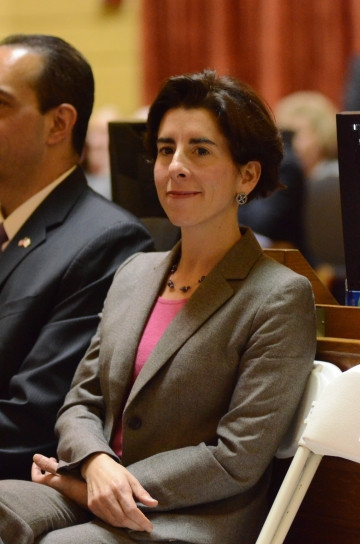Raimondo Received $21K from Employees of SEC Violators
Friday, March 01, 2013
Should the General Treasurer have accepted contributions from employees of companies with a history of SEC violations?
According to her campaign finances through the end of last year, however, Raimondo has raised well over $1 million dollar and a number of her contributions come from employees working at companies that have either been found guilty of, charged with or investigated for violations with the Securities and Exchange Commission (SEC) over the last five years.
The question is: does the label fit?
GET THE LATEST BREAKING NEWS HERE -- SIGN UP FOR GOLOCAL FREE DAILY EBLASTA 'Wall Street' Candidate
“The General Treasurer is the best fundraising position in government and New York financial institutions love her position on pension reform,” said Darrell West of the Brookings Institute. “However, in Rhode Island's political and economic climate, she has to be careful she is not seen as a 'Wall Street Candidate'.”
Gina Raimondo’s exposure to a number of big-money political contributors didn’t begin when she assumed the office of the treasurer but her work on helping to craft the state’s pension reform package brought her nationwide acclaim and immediately sparked rumors she would run for Governor in 2014.
Born in Rhode Island, Raimondo is a graduate of La Salle Academy. She later went to Harvard University for her undergraduate degree, won a Rhodes Scholarship to Oxford, and obtained a law degree from Yale University, an impressive pedigree for any political candidate but one that has served her especially well in her time as Treasurer.
“It is no secret that, with a finance background, the Treasurer comes with a private equity perspective and this allows her to raise a large amount of money from Wall Street,” said Sam Bell, Chairman of the Rhode Island Progressive Democrats of America.
Raimondo’s list of donors reads as a who’s who of some of the top companies in the country and come en masse from Wall Street’s leading investment banks.
In addition to J.P. Morgan Chase, Goldman Sachs, and Bain Capital, she has received tens of thousands from individuals tied to more than 20 leading law firms, investment firm, and banking groups.
Her New York donations alone total more than $247,000 and she has received donations from high profile national politicians like Newark, New Jersey Mayor Cory Booker, a potential US Senate candidate himself, as well as Federal Judge Jesse Furman, who was a Federal prosecutor at the time of his contribution, and Christine Green of Teach for America.
In addition, Raimondo has raised tens of thousands from a group of prominent Rhode Island CEOs who have changed their residency or recorded their home addresses in campaign finance reports as Florida rather than Rhode Island including Tom Ryan, Chairman of CVS; Terry Murray, former Chairman of Fleet Bank; and David Mixer, formerly of Columbia Capital and a partner in Point Judith Capital.
Cause for Concern
All told, Treasurer Raimondo accepted 21 contributions from New York-based employees of companies who have settled charges with the SEC within the last five years.
Of the nearly quarter-million dollars raised from New York donors, Raimondo has accepted a total of 21 contributions of $1,000 apiece from employees working from companies who have come to settlement terms with the SEC for violations that cost them over $1.4 billion dollars altogether.
Ten such contributions come from individuals who listed J.P. Morgan Chase as their employer at the time of their contribution.
In the past two years, J.P. Morgan Chase has settled at least two suits with the SEC, one coming in 2011 at a cost of $153.6 million for misleading investors and the second a combined suit with the company Credit Suisse—which had three employees contribute to Raimondo—for $400 million following a residential mortgage-backed securities controversy.
Raimondo also accepted three contributions from New York-based employees of WP Carey & Company, a company that paid $30 million in 2008 to settle SEC charges related to a fraudulent payment scheme.
In addition, campaign finance reports show the treasurer took a total of two contributions from employees working at Goldman Sachs, which paid $550 million in 2010 to settle charges that it misled investors in a subprime mortgage scandal, and Citigroup, which paid $285 million in 2011 for misleading investors about a $1 billion collateralized debt obligation (CDO) tied to the U.S. housing market.
Raimondo also accepted a contribution from an employee at Cablevision, where three employees paid a total of $60K in fines for improperly filing their expenses.
The numbers above do not include a total of 13 contributions from employees at companies who have only been charged with SEC violations, such as McKinsey and Company, Leerink Swann, Merrill Lynch, Morgan Stanley and Volt Information Sciences.
They also do not include a pair of contributions from employees working at SAC Capital Management or BNY ConvergEx Group, which have both been investigated for potential violations.
An Individual Choice
But is there anything wrong with accepting a contribution from an individual employee working at a company that may have had a run-in with the SEC?
Mark Zaccaria, Chairman of the Rhode Island Republican Party, doesn’t believe so.
“These contributions represented the individual choices of an infinitesimally small percentage of the overall employees of these giant financial firms,” he said. “There’s no doubt that these individuals are network contacts that Ms. Raimondo made during her long financial career in the private sector. It’s only natural that she should begin her fundraising with those who know her. I don’t think that fact, alone, intimates that there’s a Quid Pro Quo arrangement in play.”
Wendy Schiller, an Associate Professor of Political Science and Public Policy at Brown University, said it would be strange if Raimondo’s fundraising didn’t center largely in the financial world.
“Politicians raise money from the people they know and meet through their jobs - so it makes sense that a treasurer would receive money from financial concerns,” she said. “It would also make sense if Senator (Jack) Reed received money from banking concerns, or (Senator Sheldon) Whitehouse from lawyers (as he sits on the Senate judiciary committee). It does not necessarily translate into a distortion of influence.”
John Marion, Executive Director of Common Cause Rhode Island says that, thanks to the disclosure requirements, citizens “can judge for themselves the sources of funding for all candidates,” but wouldn’t go as far as to say how appropriate or inappropriate it was for Raimondo to accept such contributions.
“Common Cause is a huge supporter of transparency in campaign finance,” he said. “As a result of disclosure requirements we know who gives to candidates for office, including their employment information. We cannot speculate on the motives for their donations. As we've stated before, we encourage all candidates who are eligible to participate in the public financing program in Rhode Island.”
A Question of Ethics
Raimondo’s position as treasurer puts her in a unique position as a candidate in that her day-to-day professional interactions contact her with a number of financial institutions, including law firms and banks, that politicians would normally target for political contributions and fundraising efforts.
But while she won’t confirm or deny whether or not she’s running to become Rhode Island’s first female governor, Raimondo says she believes she’s done nothing wrong while fundraising and doesn’t feel her position gives her any advantage at all.
Joy Fox, a Spokesperson for the Treasurer, says Raimondo has been open and honest about all financial disclosures, not just her own.
Fox said that since coming to office, Raimondo has encouraged accountability by building, launching and maintaining the state’s first Investor Relations Portal, a “one-stop online clearinghouse for much of the state’s pertinent financial information.”
In addition, Fox said, the Treasurer has enhanced disclosure practices, implemented an additional layer of checks and balances for disclosure regarding investment advisors and campaign contributions, put in place a “no campaign donation acceptance” policy for those actively bidding on Treasury contracts, continued the placement agent disclosure practice and increased outreach to investors through direct communications, including investor road shows.
“As previously stated,” Fox said. “The Treasurer’s office is not for sale and her decisions are based on what is best for Rhode Islanders.”
Judged Unfairly?
Is Raimondo being held to a higher standard than other political candidates? Wendy Schiller thinks so.
But some feel she is being treated unfairly, whether or not she is going to pursue the state’s top elected position.
“I think the larger story is the incredible scrutiny that she has been put under by local media on her fundraising,” Schiller said. “I simply do not see the same sort of zeal applied to Governor Chafee or Mayor Taveras or Senator Whitehouse or Senator Reed. How about Senator Reed who sits on the Senate banking committee - has he received money from banking concerns, hedge funds, or investment companies? Who is giving him money?
“Let’s also recall that Governor Chafee can self-finance as he did in part in the last election so his reliance on outside contributions will be less because he is personally wealthy - so would the media rather have just rich people run for office in Rhode Island?”
If Raimondo were to run for Governor, there are a number of obstacles she would have to overcome, not the least of which involve the fate of pension reform—if declared unconstitutional, one of her signature achievements would be completely negated—and her status as a “Wall Street” insider.
And could she win election without the support of the very same labor unions she had to fight to achieve pension reform in the first place?
All of the latest polls put the Treasurer at the top of the list of potential candidates but the race is still in its earliest of stages and there are still too many variables left to concede before a clearer picture emerges.
What we do know is that, should Raimondo choose to run, she currently holds a financial and popular advantage and has the support of not only a majority within her state, but financial support of those outside Rhode Island as well.
Only time will tell if this vaults her into the State House as Rhode Island’s first female governor.





